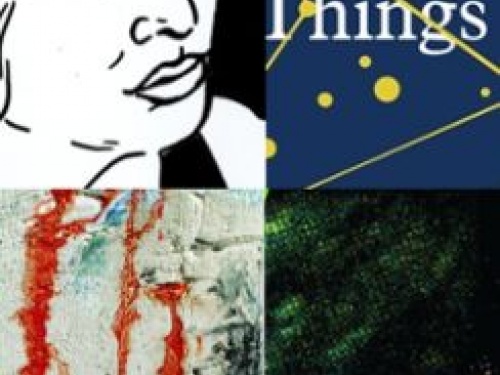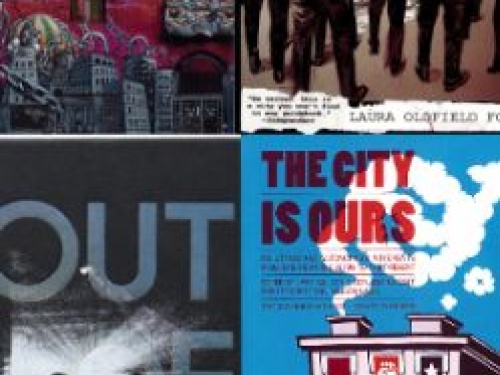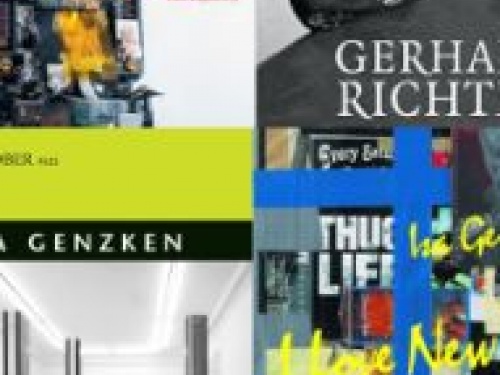ICA Book of the Year 2012
Some people hate lists, others just despise them. To keep that passion boiling, we've decided to create a literary list celebrating the best of 2012. What took your mind to the headiest height? Whose genius was the most ravishingly explosive? Who made you sob like a broken washing machine? Here's our selection, what's yours? Let us know in the comments section what your book of the year is before 21 December for a chance to win a selection of titles from the ICA Bookshop.
Part detective story, part artistic and cultural critique, “Rorschach Audio” lifts the lid on a sparkling array of perceptual and political phenomena. Crucial for everyone interested in audio art, cocktail parties, compost, lip-reading jokes, singing hair, Victorian blood painting and of course, fires.
Alain Badiou – In Praise of Love
For Badiou, love is the decision to live life through two perspectives, that of both the lover and the beloved. As such, it is more than the sum of its parts. Love “is a construction,” he writes, “a life that is being made, no longer from the perspective of One but from the perspective of Two.”
Franco 'Bifo' Berardi - The Uprising
The Uprising is an Autonomist manifesto for today’s precarious times, and a rallying cry in the face of the catastrophic and irreversible crisis that neoliberalism and the financial sphere have established over the globe. In his newest book, Franco “Bifo” Berardi argues that the notion of economic recovery is complete mythology.
Claire Bishop - Artificial Hells
Claire Bishop has been one of the few to challenge the political and aesthetic ambitions of participatory art. In Artificial Hells, she not only scrutinizes the emancipatory claims made for these projects, but also provides an alternative to the ethical (rather than artistic) criteria invited by such artworks.
This slim volume from the excellent Zero Books series is a collection of brief, interrelated reflections on sound. Cascella’s book is poetic, incisive, grounded in politics and history yet continually pushing at the edges of what we now consider to be sound.
Bridget Crone (ed.) - The Sensible Stage
The Sensible Stage is a collection of newly commissioned texts that explore the moving image in relation to performance, time and the event. Unfolding around the concept of ‘staging’, this book discusses the use of performance and theatre strategies in contemporary art as a means to question the boundaries of stage and screen. (It also includes a conversation between Alain Badiou and Elie During on theatre.)
Silvia Federici - Revolution at Point Zero
Silvia Federici is a feminist writer, teacher, and militant. This book, written between 1974 and the present, collects forty years of research and theorizing on the nature of housework, social reproduction, and women’s struggles on this terrain—to escape it, to better its conditions, to reconstruct it in ways that provide an alternative to capitalist relations.
David Graeber - Debt, the First 5000 Years
Debt in detail. Flipping conventional wisdom on its head, Graeber shows that before there was money, there was debt. For more than 5,000 years, since the beginnings of the first agrarian empires, humans have used elaborate credit systems to buy and sell goods - that is, long before the invention of coins or cash. Who would have thought debt could be so exciting?
Thomas Keenan and Eyal Weizman - Mengele's Skull The Advent Of A Forensic Aesthetics
In 1985, the body of Nazi war criminal Josef Mengele was unearthed in Brazil. The process of identifying the bones in question opened up what can now be seen as a third narrative in war crime investigations—not that of the document or the witness but rather the birth of a forensic approach to understanding crimes against humanity.
Garry Neill Kennedy - The Last Art College
How did a small art college in Nova Scotia become the epicenter of art education in the 1960s and 1970s? Visiting artists include Joseph Beuys, Sol LeWitt, Martha Rosler, Lawrence Weiner, Douglas Huebler, Lucy Lippard, John Baldessari, etc. etc. This huge book is full of the ideas taught and produced during that especially exhilarating time in art history.
Summer of Hate is a darkly humorous, emotionally honest novel about flawed reciprocity and American justice, recording recent events through the prism of a beleaguered romance. As lucid and incisive as ever, Kraus in her newest novel reminds us that the writer can be a first responder of sorts when power becomes invisible, or merely banal.
Neil Kulkarni - Eastern Spring
The humorously self-proclaimed, “Asian Morrissey" chases the sounds of his past and ancient songs from the sub-continent to try and find himself a new way of listening to some of the oldest music on earth. Part touching memoir, part ferocious polemic, Eastern Spring confronts race and the ghosts of the past in a fearless attempt to map our past, present and future as western music listeners.
Raimundas Malasauskas - Paper Exhibition
Sixteen readers have been invited to add, comment on, correct and leave their mark boldly in the margins, or way at the back, as another means of carefully replaying these words written by someone else. In this ‘book that belongs to no one and is not needed by anyone,’ according to its first author, Raimundas Malašauskas. (It is needed by you.)
Tom McCarthy, Simon Critchley et al. - The Mattering of Matter
Composed of official members and illicit “agents,” the International Necronautical Society (INS) harks back to early twentieth-century avant-gardes, producing declarations, reports, broadcasts and covert media infiltrations, all governed by the objective of mapping, entering, and occupying the space of death.
Michel Serres- Variations on the Body
World renowned philosopher, Michel Serres writes a lively text in praise of the body and movement. In praise of teachers of physical education, coaches, mountain guides, athletes, dancers, mimes, clowns, artisans, and artists… this work describes the variations, the admirable metamorphoses the body can accomplish.
Hito Steyerl - The Wretched of the Screen
These essays uncover a rich trove of information in the formal shifts and aberrant distortions of accelerated capitalism, of the art system as a vast mine of labour extraction and passionate commitment, of occupation and internship, of structural and literal violence, enchantment and fun, of hysterical, uncontrollable flight through the wreckage of postcolonial and modernist discourses and their unanticipated openings.
Set in the thick of the Arab Spring, Kapow! is guided by the high-speed monologue of an unnamed narrator — over-doped, over-caffeinated, overweight — trying to make sense of this history in real time. The design mirrors the narrator with a Marinetti and Apollinaire type twist.
Shelley Trower - Senses of Vibration
A study of the senses through the ages, Trower consults physiologists, physicists, spiritualists and poets to form a comprehensive text on the material experience of vibration.
In Heroines, Zambreno extends the polemic begun on her blog into a dazzling, original work of literary scholarship. Combing theories that have dictated what literature should be and who is allowed to write it she traces the genesis of a cultural template that consistently exiles female experience to the realm of the “minor,” and diagnoses women for transgressing social bounds. “ANXIETY: When she experiences it, it’s pathological,” writes Zambreno. “When he does, it’s existential.”
Slavoj Zizek - The Year of Dreaming Dangerously
Rage is building, and a new wave of revolts and disturbances will follow. Why? Because the events of 2011 augur a new political reality. These are limited, distorted—sometimes even perverted—fragments of a utopian future Zizek sees lying dormant in the present.
This article is posted in: Blog, Store
Tagged with: bookshop, Competition





